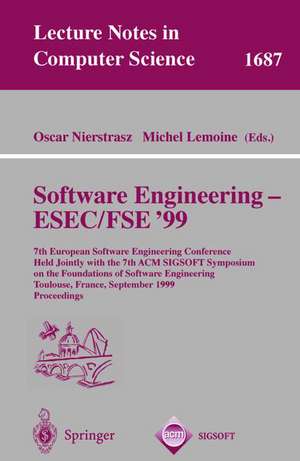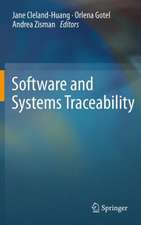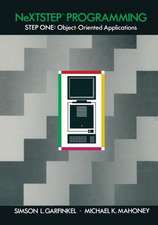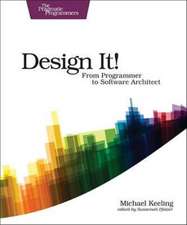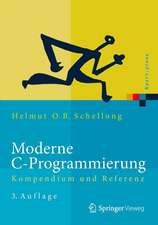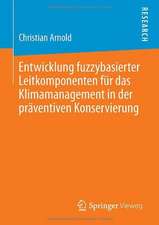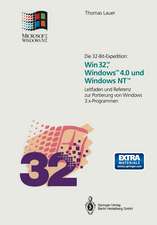Software Engineering - ESEC/FSE '99: 7th European Software Engineering Conference Held Jointly with the 7th ACM SIGSOFT Symposium on the Foundations of Software Engineering, Toulouse, France, September 6-10, 1999 Proceedings: Lecture Notes in Computer Science, cartea 1687
Editat de Oskar Nierstrasz, Michel Lemoineen Limba Engleză Paperback – 30 aug 1999
Din seria Lecture Notes in Computer Science
- 20%
 Preț: 1061.55 lei
Preț: 1061.55 lei - 20%
 Preț: 307.71 lei
Preț: 307.71 lei - 20%
 Preț: 438.69 lei
Preț: 438.69 lei - 20%
 Preț: 645.28 lei
Preț: 645.28 lei -
 Preț: 410.88 lei
Preț: 410.88 lei - 15%
 Preț: 580.46 lei
Preț: 580.46 lei - 17%
 Preț: 427.22 lei
Preț: 427.22 lei - 20%
 Preț: 596.46 lei
Preț: 596.46 lei -
 Preț: 381.21 lei
Preț: 381.21 lei - 20%
 Preț: 353.50 lei
Preț: 353.50 lei - 20%
 Preț: 1414.79 lei
Preț: 1414.79 lei - 20%
 Preț: 309.90 lei
Preț: 309.90 lei - 20%
 Preț: 583.40 lei
Preț: 583.40 lei - 20%
 Preț: 1075.26 lei
Preț: 1075.26 lei - 20%
 Preț: 310.26 lei
Preț: 310.26 lei - 20%
 Preț: 655.02 lei
Preț: 655.02 lei - 20%
 Preț: 580.93 lei
Preț: 580.93 lei - 20%
 Preț: 340.32 lei
Preț: 340.32 lei - 15%
 Preț: 438.59 lei
Preț: 438.59 lei - 20%
 Preț: 591.51 lei
Preț: 591.51 lei - 20%
 Preț: 649.49 lei
Preț: 649.49 lei - 20%
 Preț: 337.00 lei
Preț: 337.00 lei -
 Preț: 449.57 lei
Preț: 449.57 lei - 20%
 Preț: 607.39 lei
Preț: 607.39 lei - 20%
 Preț: 1024.44 lei
Preț: 1024.44 lei - 20%
 Preț: 579.30 lei
Preț: 579.30 lei - 20%
 Preț: 763.23 lei
Preț: 763.23 lei - 20%
 Preț: 453.32 lei
Preț: 453.32 lei - 20%
 Preț: 575.48 lei
Preț: 575.48 lei - 20%
 Preț: 585.88 lei
Preț: 585.88 lei - 20%
 Preț: 825.93 lei
Preț: 825.93 lei - 20%
 Preț: 763.23 lei
Preț: 763.23 lei - 17%
 Preț: 360.19 lei
Preț: 360.19 lei - 20%
 Preț: 1183.14 lei
Preț: 1183.14 lei - 20%
 Preț: 340.32 lei
Preț: 340.32 lei - 20%
 Preț: 504.57 lei
Preț: 504.57 lei - 20%
 Preț: 369.12 lei
Preț: 369.12 lei - 20%
 Preț: 583.40 lei
Preț: 583.40 lei - 20%
 Preț: 343.62 lei
Preț: 343.62 lei - 20%
 Preț: 350.21 lei
Preț: 350.21 lei - 20%
 Preț: 764.89 lei
Preț: 764.89 lei - 20%
 Preț: 583.40 lei
Preț: 583.40 lei -
 Preț: 389.48 lei
Preț: 389.48 lei - 20%
 Preț: 341.95 lei
Preț: 341.95 lei - 20%
 Preț: 238.01 lei
Preț: 238.01 lei - 20%
 Preț: 538.29 lei
Preț: 538.29 lei
Preț: 344.76 lei
Preț vechi: 430.94 lei
-20% Nou
Puncte Express: 517
Preț estimativ în valută:
65.97€ • 69.05$ • 54.91£
65.97€ • 69.05$ • 54.91£
Carte tipărită la comandă
Livrare economică 31 martie-14 aprilie
Preluare comenzi: 021 569.72.76
Specificații
ISBN-13: 9783540665380
ISBN-10: 3540665382
Pagini: 548
Ilustrații: XII, 536 p.
Dimensiuni: 155 x 235 x 29 mm
Greutate: 0.76 kg
Ediția:1999
Editura: Springer Berlin, Heidelberg
Colecția Springer
Seria Lecture Notes in Computer Science
Locul publicării:Berlin, Heidelberg, Germany
ISBN-10: 3540665382
Pagini: 548
Ilustrații: XII, 536 p.
Dimensiuni: 155 x 235 x 29 mm
Greutate: 0.76 kg
Ediția:1999
Editura: Springer Berlin, Heidelberg
Colecția Springer
Seria Lecture Notes in Computer Science
Locul publicării:Berlin, Heidelberg, Germany
Public țintă
ResearchCuprins
Extreme Programming: A Discipline of Software Development.- Components and Generative Programming.- A Component and Communication Model for Push Systems.- A Fine-Grained Model for Code Mobility.- Robots: A Real-Time Systems Architectural Style.- Collaboration and Composition: Issues for a Second Generation Process Language.- Using UML for Software Process Modeling.- A Probabilistic Model for Software Projects.- Designing Specification Languages for Process Control Systems: Lessons Learned and Steps to the Future?.- Using Model Checking to Generate Tests from Requirements Specifications.- Specification-Based Prototyping for Embedded Systems’.- Coping with Type Casts in C.- Efficient Points-to Analysis for Whole-Program Analysis.- The Concept of Dynamic Analysis.- Data-Flow Analysis of Program Fragments.- Yesterday, my Program Worked. Today, it Does Not. Why?.- Comparison Checking: An Approach to Avoid Debugging of Optimized Code.- Structural Specification-Based Testing: Automated Support and Experimental Evaluation.- An Efficient Relevant Slicing Method for Debugging.- Analyzing Exception Flow in Java™ Programs.- An Efficient Algorithm for Computing MHP Information for Concurrent Java Programs.- CoffeeStrainer: Statically-Checked Constraints on the Definition and Use of Types in Java.- The CIP Method: Component- and Model-Based Construction of Embedded Systems.- Algebraic Software Architecture Reconfiguration.- Consistency Checking for Multiple View Software Architectures.- Synergy Between Component-Based and Generative Approaches.- Transitioning Legacy Assets to a Product Line Architecture.- CHIME: A Metadata-Based Distributed Software Development Environment.- FACADE: A Typed Intermediate Language Dedicated to Smart Cards.- Verification of Real-Time Designs:Combining Scheduling Theory with Automatic Formal Verification.- Checking Progress with Action Priority: Is it Fair?.
Caracteristici
Includes supplementary material: sn.pub/extras
